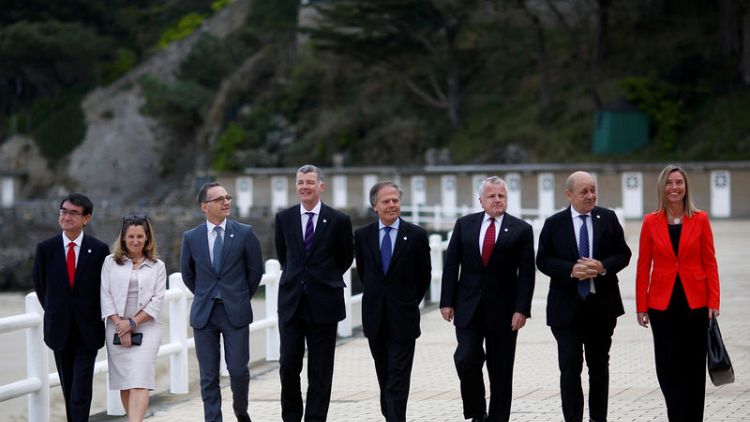By John Irish and Richard Lough
DINARD, France (Reuters) - The Group of Seven nations ended a foreign ministers' meeting in western France without quarreling on Saturday, as they looked to lay the groundwork for a leaders' summit in August despite the absence of the U.S. Secretary of State.
U.S. President Donald Trump had thrown last year's summit of the club of major industrial countries in Canada into disarray, backing out of a joint communique and firing barbs at Prime Minister Justin Trudeau.
France, which now has the G7 presidency, scaled back its ambitions for the latest meeting, focusing on areas where consensus could be found including the dangers of cyber crime for democracy, tackling inequalities between men and women, and trafficking in Africa's Sahel region.
"Last year there was an end of G7 that did not go very well but the G7 here in Dinard went very well," France's Foreign Minister Jean-Yves Le Drian told reporters, seeking to put a positive spin on the two-day meeting.
The meeting was overshadowed by the absence of U.S. Secretary of State Mike Pompeo who sent his deputy in his place. One diplomat said it sent a message that he "had better things to do".
However, it did lay out ambitions for a cyber security initiative designed to help protect liberal democracies and defend civil liberties from digital attacks, though it was the turmoil in Libya that appeared to unite them the most.
As eastern commander Khalifa Haftar swept towards Tripoli, they pressed him to halt his forces' advance on the capital as concerns grow of a civil war resurgence.
Urging restraint from all factions, the G7 said Libya's oil installations should not be used by any group for political gain. "At least there seems to be a good degree of convergence on Libya from the international community," Italy's Foreign Minister Enzo Milanesi told reporters.
KEY ISSUES
Despite that unity, Le Drian pointed out that differences on key issues were still evident, especially on the Israeli-Palestinian conflict and how to handle Iran.
"Despite the crisp air of Dinard, we couldn't overcome some of our differences," Le Drian said.
A spokeswoman for Japan's foreign ministry described the debate as friendly but at times heated and frank.
President Trump last year pulled the United States out of Iran's international nuclear deal, rejecting the approach favoured by Washington's allies to curb Tehran's nuclear ambitions.
The final communique made no mention of the Iran accord, which France, Britain and Germany continue to abide by. However, it outlined concerns over Iran's regional and ballistic missile activities, and its human rights record.
"We intend to continue our work to counter Iran’s regional proliferation of ballistic missiles and its unlawful arms transfers," the communique said.
The biggest difference was on the Israeli-Palestinian conflict. In March, Trump recognized Israel’s 1981 annexation of the Golan Heights in an election boost for Israeli Prime Minister Benjamin Netanyahu, drawing direct or implied criticism from the European Union and European capitals.
"We had an exchange of views on the Israeli-Palestinian conflict and there were clear differences," the communique read.
G7 leaders meet in southwest France at the end of August.
(Reporting by John Irish, Julie Carriat and Marine Pennetier; Editing by Richard Lough and David Holmes)
